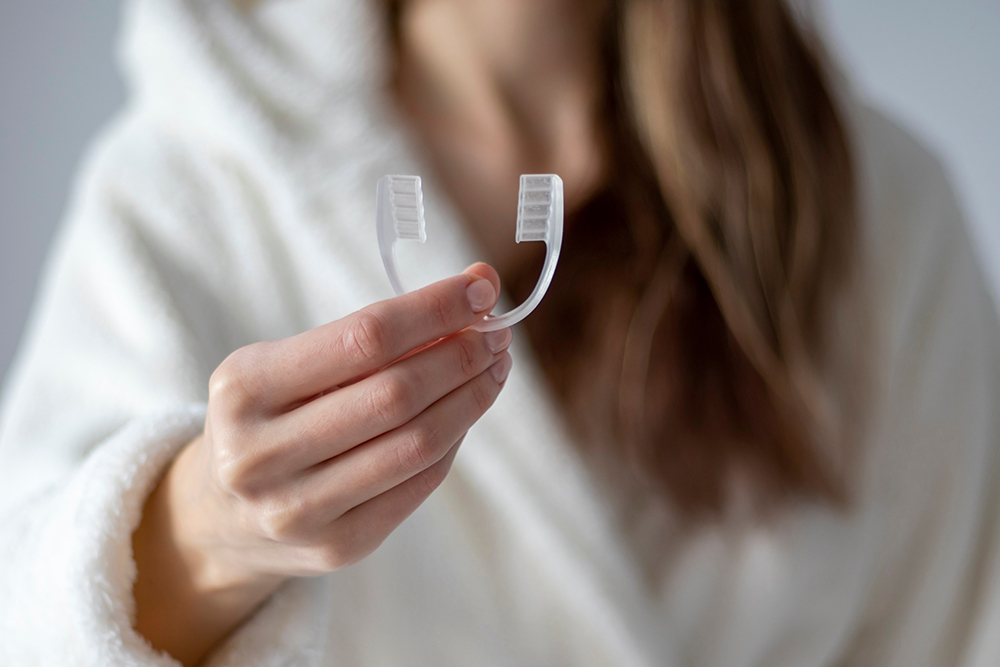Night Guard

Do you wake up with headaches or teeth or jaw pain? If so, you should visit our office for an examination. You may be in need of night guard, and if so, we can provide you with one designed to improve your oral health and even your quality of sleep. To learn more, call 760-943-7788 and schedule an appointment with Dr. Dena.
What are night guards?
These small pieces of plastic are designed to fit securely around your teeth. They are actually quite small and can fit in the palm of your hand. Typically, they are made of clear plastic, so they will not stand out when you wear them. This is excellent news for those who are self-conscious about appearance but want to save their teeth. To see what one looks like, visit our dental office.
Do I really need to wear a night guard?
If you are grinding your teeth at night – yes, you do. At Dr. Dena’s Encinitas office, we believe in the value of preventative care, and night guards are one of the ways we can prevent you from damaging your teeth. Since you only get one set of permanent teeth, allowing them to be ground down is unwise. The discomfort you will suffer and the cost you will incur to repair your teeth is simply not worth skipping out on this easy, preventative measure. We know that not all of our patients enjoy the idea of wearing a guard, and we will not recommend doing so unless we are certain that it will be useful in solving your problems.
Why do most people wear a night guard?
Prevent damage. If you have paid to repair your teeth or have had cosmetic work done to improve your appearance, teeth grinding could reverse all that the work. Even if your teeth have never needed repair, grinding can cause your teeth to chip, crack, or simply wear down. This translates into direct discomfort as the teeth flatten, and your dentin or nerves could become exposed. This can lead to feelings of sensitivity when you eat or drink. If this type of damage continues, you could end up with gum recession and even loose teeth. If you use a night guard, your upper and lower teeth will be unable to grind against each other and the potential damage will be avoided.
Ease discomfort. Nighttime teeth grinding can cause severe headaches and tooth pain in the morning. If you are regularly waking up in pain or feeling uncomfortable, this can be a sign that you need to wear a guard while sleeping. At Dr. Dena’s Encinitas office, we have found that many of our patients feel significantly better after wearing their guard for just a few days. The key is to continue wearing it every night. While some grinding is caused by stress or tension, there is no way to tell exactly what causes people to grind their teeth or to stop the body from attempting it. This is why continued use of the guard is necessary.
Treating TMJ. Severe grinding or jaw clenching can lead to TMJ disorder. This can be incredibly uncomfortable, typically starting out as a sore jaw in the morning with the occasional headache. If you experience these symptoms or have face pain, neck pain, or your jaw hurts while eating, call 760-943-7788 to schedule an appointment with Dr. Dena right away. It is critical that you treat TMJ early by wearing a night guard and preventing your teeth from clenching or grinding in your sleep. Otherwise, TMJ can become severe. At this stage, some people find it difficult to even open their mouth, let alone eat or speak normally. In some instances, you may need to be referred to a TMJ therapist.
What should I do to take care of my night guard?
Another way to keep your guard in good shape is to brush it regularly. Cleaning it is relatively easy. All you need to do is brush it with a soft toothbrush, toothpaste, and lukewarm water. This should remove the plaque that has been built upon it. Additionally, you can try a special dental solution and soak it once per week. Be sure to dry it afterward to prevent any bacteria buildup.



